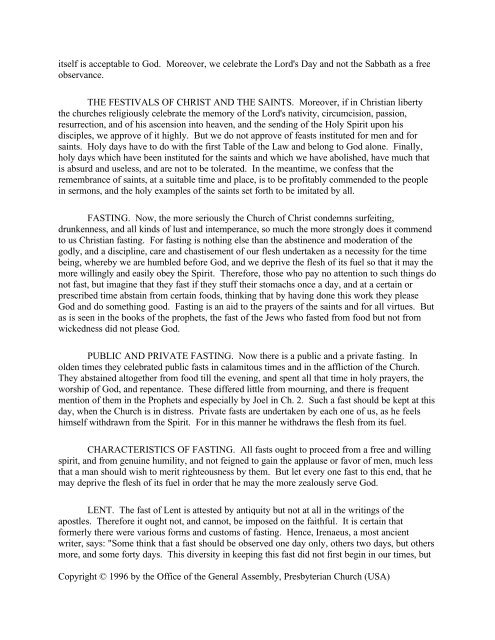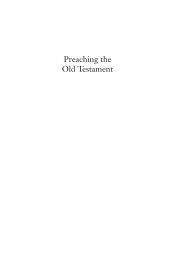The Book of Confessions - The Presbyterian Leader
The Book of Confessions - The Presbyterian Leader
The Book of Confessions - The Presbyterian Leader
Create successful ePaper yourself
Turn your PDF publications into a flip-book with our unique Google optimized e-Paper software.
itself is acceptable to God. Moreover, we celebrate the Lord's Day and not the Sabbath as a free<br />
observance.<br />
THE FESTIVALS OF CHRIST AND THE SAINTS. Moreover, if in Christian liberty<br />
the churches religiously celebrate the memory <strong>of</strong> the Lord's nativity, circumcision, passion,<br />
resurrection, and <strong>of</strong> his ascension into heaven, and the sending <strong>of</strong> the Holy Spirit upon his<br />
disciples, we approve <strong>of</strong> it highly. But we do not approve <strong>of</strong> feasts instituted for men and for<br />
saints. Holy days have to do with the first Table <strong>of</strong> the Law and belong to God alone. Finally,<br />
holy days which have been instituted for the saints and which we have abolished, have much that<br />
is absurd and useless, and are not to be tolerated. In the meantime, we confess that the<br />
remembrance <strong>of</strong> saints, at a suitable time and place, is to be pr<strong>of</strong>itably commended to the people<br />
in sermons, and the holy examples <strong>of</strong> the saints set forth to be imitated by all.<br />
FASTING. Now, the more seriously the Church <strong>of</strong> Christ condemns surfeiting,<br />
drunkenness, and all kinds <strong>of</strong> lust and intemperance, so much the more strongly does it commend<br />
to us Christian fasting. For fasting is nothing else than the abstinence and moderation <strong>of</strong> the<br />
godly, and a discipline, care and chastisement <strong>of</strong> our flesh undertaken as a necessity for the time<br />
being, whereby we are humbled before God, and we deprive the flesh <strong>of</strong> its fuel so that it may the<br />
more willingly and easily obey the Spirit. <strong>The</strong>refore, those who pay no attention to such things do<br />
not fast, but imagine that they fast if they stuff their stomachs once a day, and at a certain or<br />
prescribed time abstain from certain foods, thinking that by having done this work they please<br />
God and do something good. Fasting is an aid to the prayers <strong>of</strong> the saints and for all virtues. But<br />
as is seen in the books <strong>of</strong> the prophets, the fast <strong>of</strong> the Jews who fasted from food but not from<br />
wickedness did not please God.<br />
PUBLIC AND PRIVATE FASTING. Now there is a public and a private fasting. In<br />
olden times they celebrated public fasts in calamitous times and in the affliction <strong>of</strong> the Church.<br />
<strong>The</strong>y abstained altogether from food till the evening, and spent all that time in holy prayers, the<br />
worship <strong>of</strong> God, and repentance. <strong>The</strong>se differed little from mourning, and there is frequent<br />
mention <strong>of</strong> them in the Prophets and especially by Joel in Ch. 2. Such a fast should be kept at this<br />
day, when the Church is in distress. Private fasts are undertaken by each one <strong>of</strong> us, as he feels<br />
himself withdrawn from the Spirit. For in this manner he withdraws the flesh from its fuel.<br />
CHARACTERISTICS OF FASTING. All fasts ought to proceed from a free and willing<br />
spirit, and from genuine humility, and not feigned to gain the applause or favor <strong>of</strong> men, much less<br />
that a man should wish to merit righteousness by them. But let every one fast to this end, that he<br />
may deprive the flesh <strong>of</strong> its fuel in order that he may the more zealously serve God.<br />
LENT. <strong>The</strong> fast <strong>of</strong> Lent is attested by antiquity but not at all in the writings <strong>of</strong> the<br />
apostles. <strong>The</strong>refore it ought not, and cannot, be imposed on the faithful. It is certain that<br />
formerly there were various forms and customs <strong>of</strong> fasting. Hence, Irenaeus, a most ancient<br />
writer, says: "Some think that a fast should be observed one day only, others two days, but others<br />
more, and some forty days. This diversity in keeping this fast did not first begin in our times, but<br />
Copyright © 1996 by the Office <strong>of</strong> the General Assembly, <strong>Presbyterian</strong> Church (USA)




